#Fantasy Literature
Text


The sixth and the ninth
Currently reading Harrow the ninth and I’m hooked! Be careful with spoilers in the tags please🧎
#digital art#fantasy art#the locked tomb#gideon the ninth#harrowhark nonagesimus#palamedes the sixth#camilla hect#tamsyn muir#tlt fanart#tlt#fantasy books#fantasy literature
7K notes
·
View notes
Text
It's only called Rivendell because Elrond's Daycare and Orphanage doesn't have that Elvish feel to it.
#lotr#rivendell#elrond's daycare and orphanage#lotr humor#lord of the rings#lotr fandom#lord of the rings fandom#literature#books and reading#fantasy#fantasy books#fantasy literature#tolkien#jrr tolkien#jrrt
572 notes
·
View notes
Text
In my mind are all the tides, their seasons, their ebbs and their flows. In my mind are all the halls, the endless procession of them, the intricate pathways. When this world becomes too much for me, when I grow tired of the noise and the dirt and the people, I close my eyes and I name a particular vestibule to myself; then I name a hall.
Susanna Clarke, Piranesi
#book quotes#literature#susanna clarke#piranesi#fantasy literature#fantasy quotes#books and libraries#books and reading
438 notes
·
View notes
Text
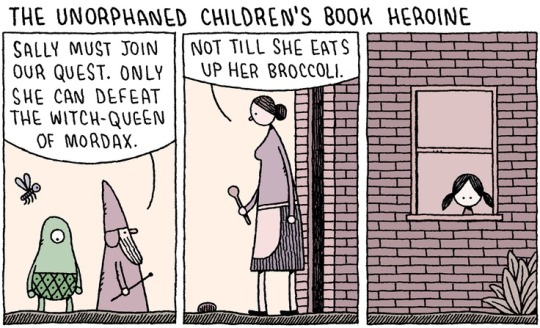
By Tom Gauld
888 notes
·
View notes
Text
Shadows of Fate 1
Summary:
Y/n, Cassian's shy and quiet sister, prefers to keep to the shadows. Unbeknownst to her, she is Azriel's mate. His shadows are inexplicably drawn to her, and as they grow closer, a slow-burn romance ensues. Cassian, ever protective of his sister, watches over her as the bond between Y/n and Azriel deepens.
Word Count: 1032
Warnings: None
Chapter 1: The Shadows Find Her
Y/n had always preferred the quiet corners of the Night Court. While Cassian thrived in the heart of every battle and social gathering, she found solace in the shadows, where she could observe without being observed. The grand halls and bustling rooms of the House of Wind often felt overwhelming to her, and she would retreat to the less frequented areas, finding peace in the stillness.
It was in these shadows that she first encountered Azriel.
She was tucked away in a dimly lit corner of the library, a book in hand, when she felt a curious sensation. It was as if the shadows themselves were reaching out to her, curling around her in a protective embrace. She looked up, her breath catching as she saw Azriel standing a few feet away, his intense hazel eyes locked onto hers.
"Hello, Y/n," he said softly, his voice a gentle caress.
"Hello, Azriel," she replied, her voice barely above a whisper. She had always admired the Spymaster from afar, but his presence now was both comforting and unsettling.
Azriel took a step closer, his shadows swirling around him, almost as if they were drawn to her. "I hope I'm not disturbing you."
"No, not at all," Y/n said, closing her book. "I was just reading."
He nodded, his gaze lingering on her face. "I’ve seen you around here often. You seem to prefer the quiet places."
She smiled shyly. "I do. It's peaceful."
Azriel's shadows brushed against her, and she felt a strange sense of connection. "I understand. I find peace in the shadows too."
They spent the next hour talking quietly, sharing stories of their childhoods and their lives in the Night Court. Y/n found herself opening up to Azriel in a way she hadn’t with anyone else, not even Cassian.
The next few days saw Azriel and Y/n encountering each other more frequently. Every time Y/n sought out her quiet refuge, Azriel seemed to be there, as if the shadows themselves guided him to her. The connection between them grew stronger with each meeting, their conversations delving deeper into personal histories and shared dreams.
One afternoon, while Y/n was browsing through the ancient texts in the far corner of the library, she felt a familiar presence. She turned to see Azriel leaning against the doorway, watching her with a soft smile.
"You always manage to find the most secluded spots," he remarked, walking over to join her.
She laughed lightly, the sound musical and soothing. "It's a talent of mine."
Azriel’s smile widened. "Mind if I join you?"
"Not at all," she replied, motioning to the chair beside her.
As they sat together, Azriel’s shadows began to playfully swirl around Y/n, almost like they were welcoming her. She reached out a hand, letting the shadows dance over her fingers, their cool touch sending shivers down her spine.
"Your shadows seem to like me," she observed, her eyes meeting his.
"They do," Azriel admitted, his voice tinged with something she couldn’t quite place. "They’re drawn to you, just like I am."
Y/n’s heart skipped a beat at his words. There was a depth to his gaze, an intensity that both excited and frightened her. She looked away, trying to calm her racing thoughts.
Azriel reached out, gently tilting her chin back towards him. "You don’t have to hide from me, Y/n. I see you."
Her breath caught in her throat, the vulnerability in his words breaking down her walls. "I’m not used to being seen," she whispered.
"Then let me be the one to see you," he replied softly, his thumb brushing over her cheek. "All of you."
Their encounters became a daily occurrence. Azriel would often find Y/n in the library, the garden, or some other quiet corner of the House of Wind. Each time, his shadows would eagerly greet her, wrapping around her like a protective cloak.
One evening, as the sun set over Velaris, Y/n found herself in the garden, tending to the flowers. She had always found solace in nature, the vibrant colors and delicate scents grounding her. She was lost in thought when she felt a familiar presence beside her.
"Beautiful evening," Azriel commented, his voice low and soothing.
"It is," she agreed, looking up at him with a smile. "I come here to clear my mind."
Azriel nodded, his eyes reflecting the golden light of the setting sun. "I understand. It’s one of my favorite places too."
They walked through the garden together, their conversation flowing effortlessly. Y/n found herself opening up about her hopes and fears, the dreams she had for the future. Azriel listened intently, his presence a comforting anchor.
As they reached a secluded bench, Azriel turned to her, his expression serious. "Y/n, there’s something I need to tell you."
She looked at him, her heart racing. "What is it?"
He took a deep breath, his eyes never leaving hers. "I think... I think you might be my mate."
The world seemed to stop at his words. Y/n felt a whirlwind of emotions, fear, and hope battling within her. "Mate?" she whispered, her voice trembling.
Azriel nodded, his expression earnest. "I’ve felt a connection to you since the moment we met. My shadows are drawn to you, just as I am. I’ve never felt this way about anyone."
Y/n took a step back, her mind racing. "This is... a lot to take in."
"I know," Azriel said softly, reaching out to take her hand. "And we can take things as slowly as you need. But I want you to know that I’m here for you, always."
She looked into his eyes, seeing the sincerity and love there. Slowly, she nodded, a tentative smile forming on her lips. "Thank you, Azriel. I think... I think I feel the same way."
As they sat on the bench, the sun dipping below the horizon, Y/n felt a sense of peace she had never known before. She knew the journey ahead would be filled with challenges, but with Azriel by her side, she felt ready to face whatever came their way.
Author's Note: Thank you for reading, I hope you enjoyed this part. Feel free to leave a comment or send me prompts!
#ACOTAR#A Court of Thorns and Roses#ACOTAR fanfiction#Azriel x Reader#Azriel fanfic#Night Court#Velaris#Feyre Archeron#Sarah J Maas#SJM#Azriel#Shadowsinger#Fantasy Romance#Book Fanfiction#Azriel x Y/n#Azriel love story#Shadows of Fate#Fanfic writers#ACOTAR fandom#Bookish#Slow burn romance#Protective brother#Character relationships#Emotional vulnerability#Shy protagonist#Fantasy literature#Character development#Romantic fanfic#Y/n and Azriel#Cassian's sister
122 notes
·
View notes
Text
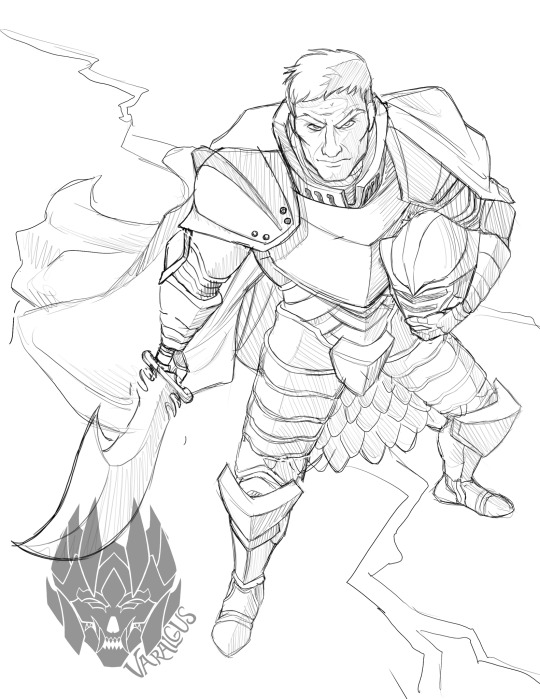
Dalinar Kholin. Big Ol’ WIP of my favorite bondsmith. I’d argue that his character arc and development is on par with Prince Zuko, one of the most well written characters I’ve read.
#fantasy#illustration#artwork#fantasy character#digital painting#sketch#digital sketch#stormlight archive#stormlight#dalinar kholin#dalinar#brandon sanderson#fantasy literature#kaladin stormblessed#knights radiant#roshar#alethi#bondsmith#the shattered plains#reading#fanart#stormlight archive fanart#stormlight fanart#stormlight spoilers#shardplate#oathbringer#the way of kings#words of radiance#rhythm of war#cosmere
304 notes
·
View notes
Text
Stick em with the pointy end
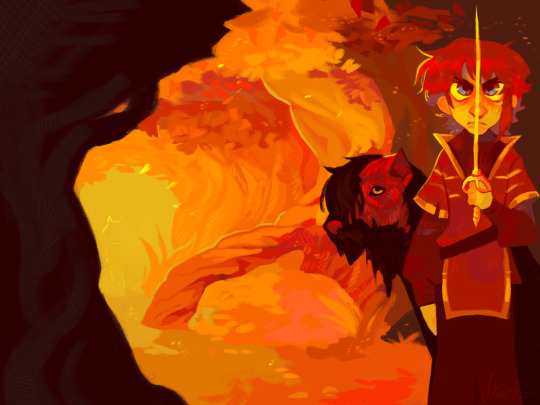
#arya stark#arya#arya stark fanart#the hound#arya asoiaf#the hound asoiaf#the hound game of thrones#sandor clegane#sandor clegane fanart#game of thrones fanart#game of thrones#got fanart#a song of ice and fire#asoiaf fanart#a song of ice and fire fanart#needle#needle asoiaf#fantasy art#fantasy#fantasy literature#george rr martin#grrm#my art
88 notes
·
View notes
Text
"Love doesn't solve problems . . . Solving problems solves problems."
Xiran Jay Zhao, Iron Widow
#Xiran Jay Zhao#Iron Widow#solving problems#problem solver#problems#solutions#Chinese Canadian literature#fantasy book#fantasy literature#quotes#quotes blog#literary quotes#literature quotes#literature#book quotes
200 notes
·
View notes
Text
About the "Tolkienesque renaissance"
The term "Tolkienesque renaissance" is of my own invention and creation, but it is a name I use to designate a very specific wave of fantasy fiction, or rather a specific phenomenon in the evolution of fantasy in the English-speaking literature.
As we all know, Tolkien's shadow cannot be escaped when doing fantasy. Tolkien's works being published began the modern fantasy genre as we know it today. D&D, the other big "influencer" of fantasy, would not have existed without Tolkien. The Peter Jackson trilogy began the fantasy renewal of the 21st century. Epic fantasy is a sub-genre explicitely designed after Tolkien's work.
And the massive influence of Tolkien over fantasy is the most felt in the second half of the 20th century, in English-speaking literature, through something I would call the "Tolkien cold-war". When you take a look at the fantasy books of the second half of the 20th century, you notice a fundamental clash and divide splitting it all in some sort of silent feud or discreet conflict. On one side, you have the "Tolkien followers" - as in, the authors who walk in Tolkien's footsteps ; on the other side, you have the "counter-Tolkien" offering what is essentially a counter-culture in a Tolkien-dominated fantasy.
We all know that Tolkien's success was huge in the early second half of the 20th century. The success of "The Lord of the Rings" and the "Hobbit" and the "Silmarillion" was especially important during the 60s and 70s - Gandalf for president and all that... People loved Tolkien's fantasy, people WANTED Tolkien's fantasy, and so publishers and others were happy to oblige. This began the "Tolkien followers" movement - but this beginning was a very unfortunate one, because it was one that relied on not just homage, imitation or pastiche... But in pure copy-cat and sometimes complete rip-off. Since people wanted some Tolkien, people were given LITERAL Tolkienesque fantasy. The most famous (or unfamous example of this would be the 1977 's "The Sword of Shannara" novel. This novel was designed to literaly be a simplified "The Lord of the Rings" with only a few details changed here and there. In fact, this is most of what people recall about this book - how blatant of a Tolkien rip-off it is. And yet, this book was a BEST-SELLER of the 70s fantasy, and it was a huge success, and everybody loved it, precisely because it did the same thing Tolkien did, and so you got to enjoy your favorite series all other again. Afterward, Terry Brooks, the author of the novel, expanded it into a complete series moving into much more original and personal directions, as he admitted himself that doing a Tolkien copy-paste was more of a publishing and editorial decision to make sure he would sell and settle himself in the literary landscape rather than an actual artistic project or personal desire. "The Sword of Shannara" got its own sequels, and became its own thing (though VERY reflective of what the 80s American fantasy was in terms of style, tone and content), but nowadays everybody remembers it for being the "Tolkien rip-off" in its first novel.
And yet being a Tolkien rip-off can sell well, and if the "Shannara" series hadn't proved it, "Dungeons and Dragons" did, since its first edition in the late 70s went as far as to just take Tolkien's inventions such as orcs, Balrogs and hobbits, and include it in its game. The same way the Shannara series then found its own tone and content, through the successive editions Dungeons and Dragons then began to build a world of its own... But it confirms what I said: it was the era of the Tolkien rip-offs.
In front of these "Tolkien followers", which were back then "Tolkien imitators", there was another movement that drove fantasy forward - and it was the "counter-Tolkien movement" so to speak. Works of fantasy that willingly chose to depart from Tolkien's formulas and archetypes and tropes, to do their own thing. Sometimes they did it out of an actual dislike of Tolkien's books: for example the "Elric Saga" was created because Moorcock hated the paternalist, moralist tone of The Lord of the Rings, and so he countered Tolkien's world with a protagonist serving the Lords of Chaos, using a soul-sucking evil sword, last remnant of an empire of cruel, decadent and demonic elves, in a tragic world doomed to endless falls and oblivions... (Though, ironically, Moorcock would end up initiating a genre of dark fantasy that Tolkien himself had explored in his unpublished texts...). Others did it not because they disliked Tolkien but wanted to prove you could do something else: for example Ursula Le Guin admired and appreciated Tolkien's works, but she was fed up with all the imitators and pastiches, and so she created her "Earthsea" world. No European setting dominated by white people, but an archepilago of islands with dark-skinned characters. No big war or political manipulations, the stories being about about the life, journeys and evolution of individual people. No sword-wielding hero or horse-riding paladin, but wizards and priestesses as the protagonists. No big prophecy about the end of the world, flashy magical sword or evil overlord ready to destroy the universe (well... almost), but rather philosophical and existential battles doubling as a fight against oneself and one's very existence...
This counter-Tolkien genre definitively peaked with the other big name of "dark fantasy" and what would annonce the "grimdark fantasy" a la Game of Thrones: Glen Cook's The Black Company.
But what about the titular "Tolkienesque renaissance" I speak of?
Well, if the "Tolkien followers" had only done bad rip-offs, it would have never lasted, ad the "counter-Tolkien" movement would have won. In fact in the 80s, it almost did! Tolkienesque fantasy was thought of as cliched and stereotyped and overdone and dead. People had enough of these blatant-rip offs, as the hype of the 60s and 70s had died out, and the 80s folks turned to other forms of fantasy - such as The Black Company (Dark Fantasy), or Fafhrd and the Gray Mouser (Sword and Sorcery), or various parodies and humoristic fantasies, but all far from the "epic fantasy". And yet, something happened... The "Tolkien imitators" became "Tolkien followers" or rather "Tolkien reinventors", and began the "Tolkienesque renaissance".
The Tolkienesque renaissance is this group of fantasy authors, most predominant in the 90s though they began their work by the late 80s, that decided they would make the Tolkienesque fantasy live on. Not just by copying it as their predecessors did, a la Shannara, no. But by reinventing it, freshening up the old ways for a modern audience and new times. They took back all the key ingredients, and the famed archetypes and the usual tropes of the epic fantasy a la Tolkien, and they reused them without shame... But in new ways, with twists and turns, playing on the codes of the genre, while carefully avoiding the cliches and stereotypes of the time. Giving what people liked about epic fantasy, while also producing new works that felt fresh and went into opposite directions - taking lessons from the counter-Tolkien movement.
It is commonly agreed that the series that began this renaissance was David Eddings' The Belgariad, published between 1982 and 1984. Just a look at the Wikipedia article mentions this best-selling, very influential fantasy series was the "last gasp of traditional fantasy, and the founding megasaga of modern fantasy"... Now, I actually have to disagree with Wikipedia's words. I do not consider it a "last gasp of traditional fantasy" since it already began the Tolkienesque renaissance and thus a new generation of fantasy ; and the other qualificative is ridiculous since modern fantasy already began with Tolkien, and the Belgariad is not a mega-saga, but just five average-sized books. But the idea of it being a link between an older and a newer generation of fantasy books is very true.
While The Belgariad has to be put first, second comes Robert Jordan's The Wheel of Time, which probably is the most famous of the Tolkienesque renaissance works of the 90s and became this behemoth of fantasy literature. And to make a trilogy of iconic works, I will add another 90s success: Tad Williams' "Memory, Sorrow and Thorn". Another iconic work of the Tolkienesque renaissance, though lesser known today than the Belgariad or The Wheel of Time - which is a shame, because Williams' work as a huge and heavy influence on a famous fantasy story of today... "A Song of Ice and Fire", which takes a LOT from "Memory, Sorrow and Thorn" (I even call this trilogy the "missing link" between LotR and ASoIaF).
The thing with these Tolkienesque renaissance series is that today, to an audience that was nourished by Tolkien and D&D and Pratchett and other things of the sort, a superficial glance might make them seem like "yet other rip-offs, yet other stereotyped, yet other clichéed" fantasy series. You just have to see the reception of the first season of "The Wheel of Time" tv series - here there was a clash between two generatons of fantasy.
And what these people who take a superficial glance will miss is how inventive and fresh and interesting these series felt back then because they played with or subverted the tropes and the codes of the traditional fantasy. They all played by the usual archetypes - you have an everyman young chosen one, a magical mentor who must "die" at one point, an evil overlord in an ominous half-disembodied state, evil black-clad horsemen going after the hero, elves and dwarves and trolls... And yet, these series twisted these same ingredients they used to bring new flavors.
Let us take the Belgariad briefly, to see how the whole Tolkienesque formula was subverted. Like in Tolkien you've got an order of wizards appeared as elderly, bearded men - but here, they are definitively human beings unlike the otherwordly Istari, and their appearance is explained by them being the disciples of a god that likes to take the appearance of a bearded old man, and who by divine influence made them look like him. You've got a dangerous, all-powerful item the big bad is seeking to destroy the world - but here it is no evil, or corrupting thing. It is rather an item dangerous because of the sheer scope and range of its power, and the temptation isn't becaue it is "evil" power, but just because it is a power so massive it can break the world. You've got a missing king with a stewart/regent holding the throne for him until the lost heir returns - but when said heir returns, the stewart/regent is no evil vizir or scheming usurper, and gladly offers back the throne to its legitimate owner. Belgarath, your Gandalf-stand-in, is far from being the dignified guide and noble mentor of Tolkien, as he is a half-werewolf drunkard that hates any kind of official ceremony or garb and prefers running through the woods or rolling under a table in taverns. And while everything is designed as a Tolkienesque setting, you've got no elves or dwarves or orcs - but humans. And that's a big change compared to more traditional 80s fantasy (like D&D or the Krondor series or Shannara). You have your Nazgûl stand-ins, but they're humans. You've got your Istari, but they're humans. You've got your dwarves equivalent, but they're humans. You've got your orcs equivalents, but human too. And it is shown that it is all a human vs human combat, despite being a world of magic and gods, placing some relativism into it all. (Though the fact they decided to subvert the Tolkienesque good vs evil wordlbuilding by having humans on both sides did cause other aspects of the series to age badly but that's another topic).
I can go on and on but I think you see my point - and this same subversion can be found in the other two series I talked about.
The Wheel of Time begins with the chosen one going on a quest... But which chosen one? That's the problem - there are multiple candidates, and so we begin with a guessing game. And the Aes Sedai are clearly an answer to Tolkien's Istari - but all women instead of all men, and much more numerous and pro-active. As for "Memory, Sorrow and Thorn" we have benevolent trolls that are actually more akin to Tolkien's dwarves and have some Inuit-influence, while the Tolkienesque-elves turn out to either be the big bads of the series and the evil guys ; or to be sheltered, useless side-characters that are not helping anyone and cause more problems than anything (I'm exaggerating a bit here, but you get the subversion). Spoilers - but the Galadriel equivalent literaly gets murdered during her second actual appearance, to make it very clear what kind of subversion we are into.
Because this was the game of these books - and the reason they were such huge successes. It wasn't about avoiding or setting themselves free from the tropes and code and archetypes of the genre. Rather it was about reappropiating them, reusing them, twisting them and modernizing them in order to get rid of the stale cliches and frozen stereotypes. It was all a game of imitation yes, but also of derailing - a subtle, discreet, derailing so that everybody got on board of the same type of train, but said train took different tracks to another landscape and worked on a different fuel. (If it makes sense?). It is a game of subtle twists - but unfortunately it is often this subtlety that makes these series overlooked, as people just focus too much on what is identical/similar and not much on what is different... Despite the differences being key here in this effort of renewing what was a dying style. Placing back these books in their context highlights even more how "fresh" they felt back then.
I have one specific point that illustrates this, but I'll need to write a whole post for it...
#fantasy books#fantasy literature#tolkienesque renaissance#tolkien#the belgariad#the wheel of time#memory sorrow and thorn#fantasy series#the elric saga#earthsea#the black company#lord of the rings#lotr#tolkienesque fantasy#dark fantasy#epic fantasy#fantasy cliches#fantasy tropes#the evoluton of fantasy
59 notes
·
View notes
Text
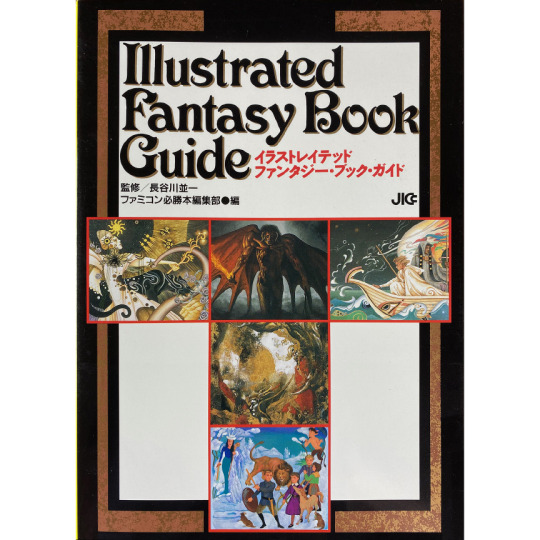
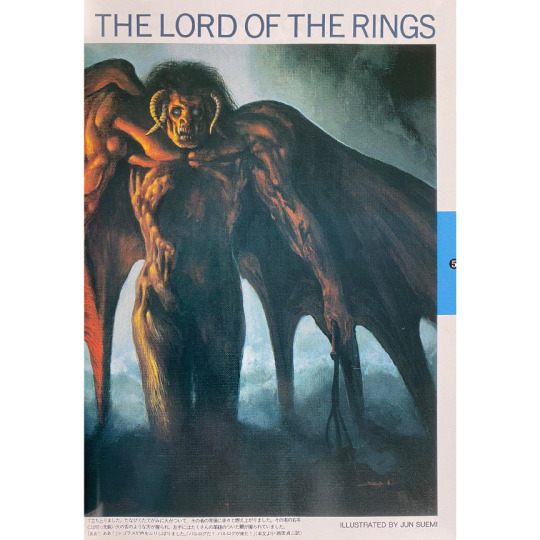
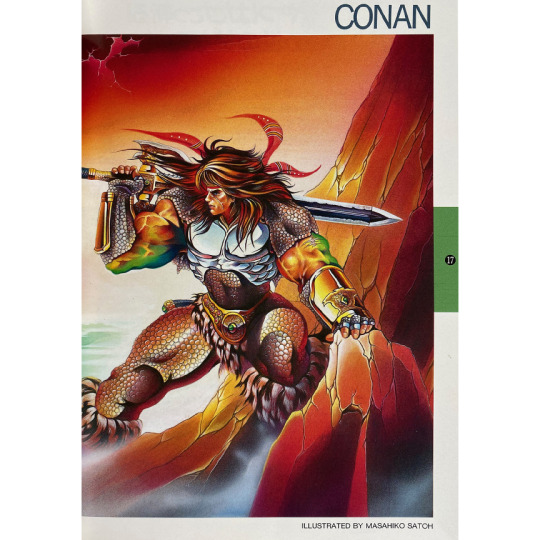
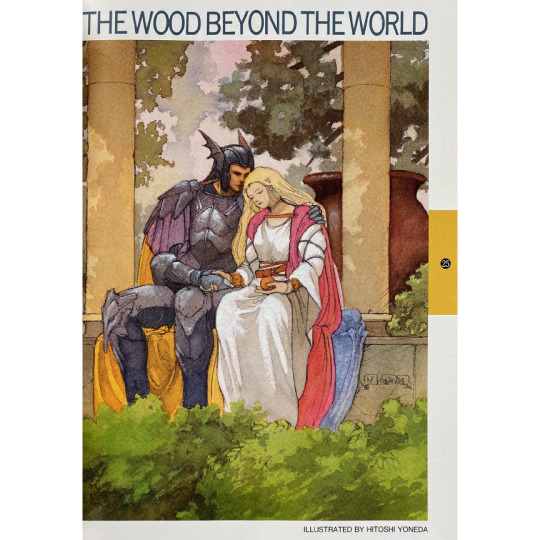
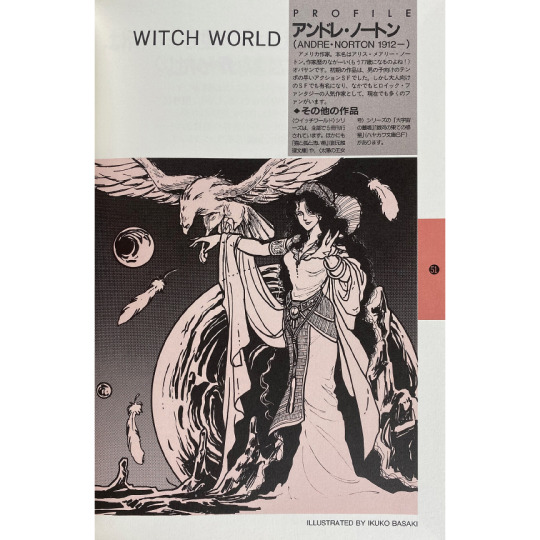
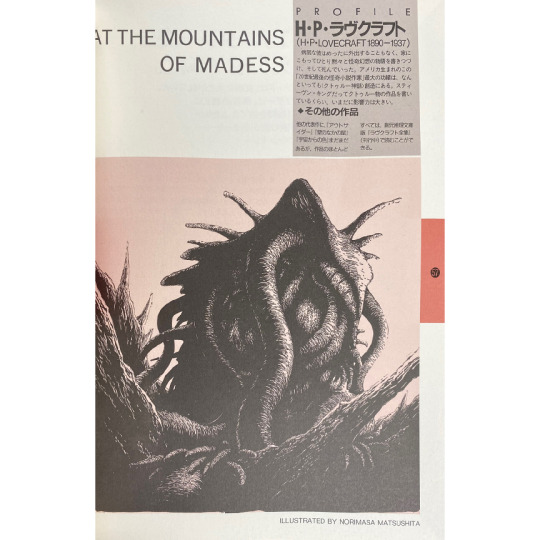
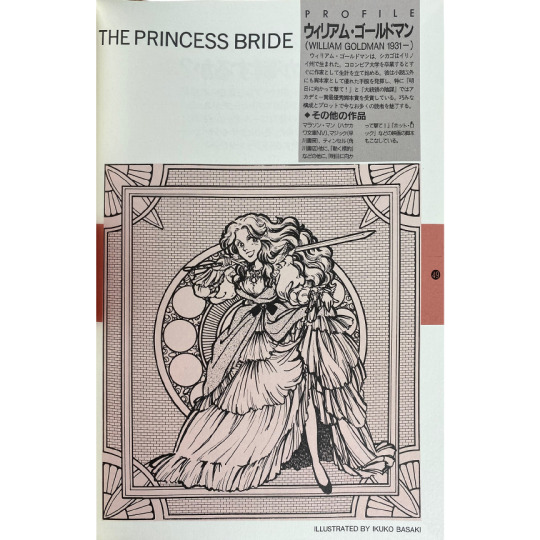
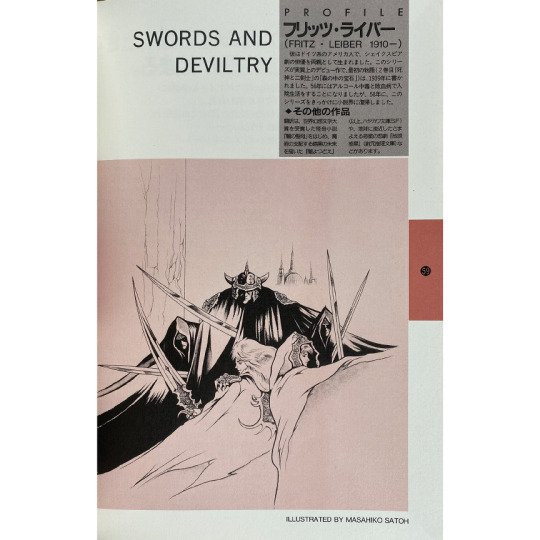
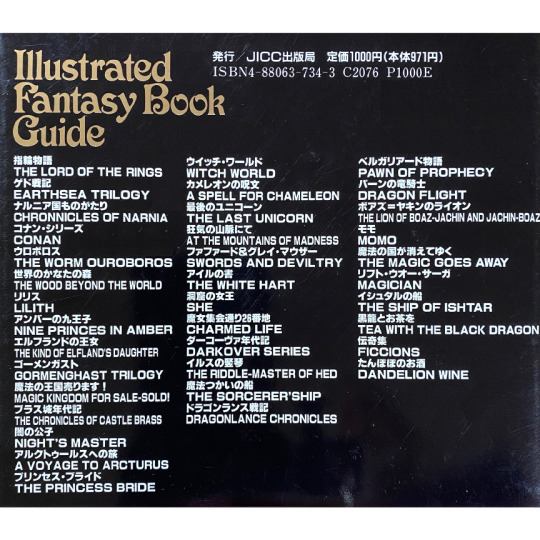
The “Illustrated Fantasy Book Guide” is a magazine-format book (or mook) released in 1989 by the publisher of ファミコン必勝本 “Famicon Winning Book”, an NES gaming magazine. The mook lists 37 works of fantasy originally written in English except for “Ficciones” by Borges. The editors of “Famicon Winning Book” were fond of the Wizardry port to the NES, which is my explanation for their interest in this stuff. In any case, they created the best Appendix N so to speak of fantasy translated into Japanese that I have yet found. The Japanese titles are provided below to aid the online searches of would-be buyers.
Images/Text courtesy of Japanese Tabletop RPG
I wish I could find a complete set of scans for this book!
Full list of books featured under the cut.
The Lord of the Rings 指輪物語
Earthsea Trilogy ゲド戦記
Chronicles of Narnia ナルニア国ものがたり
Conan コナン・シリーズ
The Worm Ouroboros ウロボロス
The Wood Beyond the World 世界のかなたの森
Lilith リリス
Nine Princess in Amber アンバーの九王子
The King of Elfland’s Daughter エルフランドの王女
Gormenghast Trilogy ゴーメンガスト
Magic Kingdom for Sale-Sold! 魔法の王国売ります!
The Chronicles of Castle Brass ブラス城年代記
Night’s Master 闇の公子
A Voyage to Arcturus アルクトゥルスへの旅
The Princess Bride プリンセス・ブライド
Witch World ウィッチ・ワールド
A Spell for Chameleon カメレオンの呪文
The Last Unicorn 最後のユニコーン
At the Mountains of Madness 狂気の山脈にて
Swords and Deviltry ファファード&グレイ・マウザー
The White Hart アイルの書
She 洞窟の女王
Charmed Life 魔女集会通り26番地
Darkover Series ダーコーヴァ年代記
The Riddle-Master of Hed イルスの竪琴
The Sorcerer’s Ship 魔法つかいの船
Dragonlance Chronicles ラゴンランス戦記
Pawn of Prophecy ベルガリアード物語
Dragon Flight パーンの竜騎士
The Lion of Boaz-Jachin and Jachin-Boaz ボアズ=ヤキンのライオン
Momo モモ
The Magic Goes Away 魔法の国が消えていく
Magician リフトウォー・サーガ
The Ship of Ishtar イシュタルの船
Tea with the Black Dragon 黒龍とお茶を
Ficciones 伝奇集
Dandelion Wine たんぽぽのお酒
#Illustrated Fantasy Book Guide#Fantasy#Art#Illustration#Fantasy Literature#The Lord of the Rings#Jun Suemi#Conan the Barbarian#Masahiko Satoh#The Wood Beyond the World#Hitoshi Yoneda#Witch World#Ikuko Basaki#At the Mountains of Madness#Norimasa Matsuhshita#The Princess Bride#Swords and Deviltry
50 notes
·
View notes
Text


Idiots in class (both groups are failing)
#tlt#the locked tomb#gideon the ninth#gideon nav#harrow the ninth#tlt fanart#palamedes sextus#camilla hect#ianthe tridentarius#coronabeth tridentarius#fantasy art#fantasy books#fantasy literature
8K notes
·
View notes
Text
Remember when Dex tweaked the hair serum to make Stina grow a beard? And then at school he made fun of her by saying, "Nice beard you got there. Hope you know how to shave."
Which means...
Elves know what beards are. They know what shaving is. Where are the bearded Elves, Shannon? Where are they?
#kotlc#keeper of the lost cities#kotlc reread#kotlc book 1#sophie foster#dex dizznee#stina heks#shannon messenger#elves#middle grade fantasy#fantasy literature
164 notes
·
View notes
Text
There was a memory in the land. It was all around him. He was walking through it. It whispered to him as he walked…
Robert Holdstock, Lavondyss
#book quotes#literature#robert Holdstock#Lavondyss#books and libraries#books and reading#fantasy literature#mythic#nature quotes#walking in nature
152 notes
·
View notes
Text
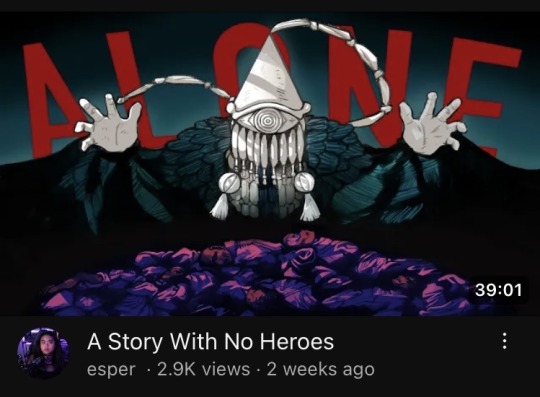
youtube
#witch hat atelier#a story with no heroes#heroism#no heroes#video essay#writing#worldbuilding#worldbuilding stuff#fantasy#fantasy world#fantasy writing#manga#anime and manga#anime#anime video#manga video#anime community#manga community#fantasy literature#fantasy manga#tumblr recommendations#recommend#recommendation#youtube#youtube content#youtube recommendations#youtube video#video recommendation#youtube link#video link
58 notes
·
View notes
Text
Love in the Shadows Pt. 1
Summary:
Azriel's mission takes an unexpected turn when he encounters Y/n, a mysterious woman in a dangerous situation. The events of that night not only save Y/n's life but also change Azriel's forever.
Word count: 735
Warnings: None
Rescue in the Shadows
Azriel moved through the dark streets of Velaris with practiced ease, his shadows cloaking him from sight. Tonight's mission was supposed to be straightforward—gather information on a suspected rebel group stirring trouble in the lower districts. But as he approached the dilapidated warehouse where his sources indicated activity, something felt off.
He paused, his shadows whispering of danger. Quietly, he slipped into the shadows, becoming one with the darkness as he surveyed the scene. Inside the warehouse, he could make out several figures—armed and tense, their voices hushed but urgent.
And then he saw her.
She was bound and gagged, fear evident in her eyes as she was shoved to the ground. The leader of the group, a tall, scarred male, circled her like a predator.
"This one thought she could steal from us," the leader sneered. "But we'll make an example out of her."
Azriel's blood ran cold. He had seen this group before—ruthless, unforgiving. He had to act quickly. Silently, he assessed the situation, formulating a plan. He couldn't afford to make a mistake; her life depended on it.
His shadows moved ahead of him, snaking into the warehouse and creating small disturbances to distract the guards. In the confusion, Azriel slipped inside, his eyes never leaving the woman.
With a swift, calculated move, he incapacitated the nearest guard, his blade silent and deadly. One by one, he took them down, his movements a blur of efficiency. Finally, only the leader remained.
The leader turned, too late to react as Azriel's blade pressed against his throat. "Leave," Azriel hissed, his voice a low, dangerous growl. "And never return."
The leader's eyes widened in terror before he nodded frantically. Azriel released him, and the man fled, stumbling over the bodies of his fallen comrades.
Azriel's focus shifted to the woman. He knelt beside her, his hands gentle as he removed her gag and cut the ropes binding her wrists. "Are you alright?" he asked, his voice softer now.
She nodded, her eyes wide with a mix of relief and gratitude. "Thank you," she whispered, her voice trembling. "I... I didn't think anyone would come."
Azriel offered a reassuring smile, helping her to her feet. "You're safe now. Can you walk?"
"I think so," she replied, leaning on him for support as she took a tentative step. "Who are you?"
"Azriel," he introduced himself, his shadows retreating slightly, allowing her to see him more clearly. "I'm with the Night Court."
Her eyes widened in recognition. "I've heard of you. The Spymaster."
Azriel nodded, his expression serious. "Let's get you out of here. Can you tell me what happened?"
As they made their way out of the warehouse, she recounted her story. She had stumbled upon the rebel group's hideout by accident, and when she realized what she had found, it was too late to escape. The group had captured her, intending to make an example out of her.
"You were very brave," Azriel said, guiding her through the quiet streets. "And very lucky. Not many would survive an encounter with them."
She glanced at him, her eyes filled with admiration. "I was lucky you found me."
Azriel felt a warmth spread through his chest at her words. "I'm just glad I was there in time."
As they reached the safety of the Night Court's borders, Azriel knew this night would stay with him. Not just because of the danger, but because of her—their courage, their resilience. He felt a connection to her, something he hadn't expected but couldn't deny.
"Thank you, Azriel," she said again, her voice stronger now. "For everything."
Azriel nodded, a small smile playing on his lips. "You're welcome, Y/n. And remember, you're not alone anymore. If you ever need help, you know where to find me."
In that moment, under the stars of Velaris, a bond was formed. One that would grow stronger with time, forged in the shadows but destined to shine brightly.
Author's Note: Thank you for reading! I hope you enjoyed this glimpse into how Azriel and Y/n's paths first crossed. Feel free to leave comments and let me know your thoughts!
#ACOTAR#A Court of Thorns and Roses#ACOTAR fanfiction#Azriel x Reader#Azriel fanfic#Night Court#Velaris#Feyre Archeron#Sarah J Maas#SJM#Azriel#Shadowsinger#Fantasy Romance#Book Fanfiction#ACOTAR one-shot#Azriel x Y/n#Azriel love story#Bookish#Fiction writing#Fanfic community#Fantasy literature#ACOTAR fandom#Spymaster#ACOTAR series#Velaris at night#Rescue in the Shadows#Fanfic writers#Book tags#Fantasy adventure#Romantic fanfic
74 notes
·
View notes
Text


“This is a very bad idea,” Jacks murmured.
“I would have thought you liked bad ideas.”
“Only when they’re mine.” He stood very still as her fingers reached
✧.*
#evajacks#jacks prince of hearts#jacks x evangeline#jacks of the hollow#evangeline fox#ouabh#tbona#acftl#acftl spoilers#ella edit✨#storyseekers#booknet#fantasy literature#fictionnet#yalit#yalitedit
81 notes
·
View notes